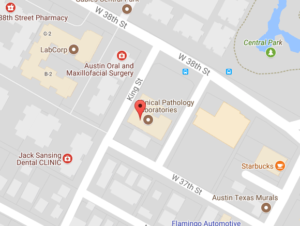
The following information is from Dr. Brian Metzger, MD, MPH on the current state of COVID-19 serology testing. Dr. Metzger is a member of the Austin Public Health COVID-19 Expert Advisory Panel and the infectious disease consultant to the Travis Medical Society ED/EMS Advisory Committee.
There is a growing concern about the current offering of serology testing for SARS-CoV-2, the virus responsible for COVID-19.
What is serology testing?
With the use of a blood sample, it can identify antibodies produced against the virus. Serology testing is different from molecular testing, which is used to diagnose active infection by detection of genetic material of the virus. As we have seen, this is typically done by a nasopharyngeal swab. Soon, serology testing will be used in the following ways:
- To help determine the prevalence of SARS-CoV-2 in the population
- Identify individuals in the community who are immune
- Help delineate the phase of the infection (recent past vs. distant past)
- Identify donors for therapeutic plasms
- Possibly help with return-to-work decisions
Serology testing can identify whether antibodies are being made and which type of antibody. The most common serology testing involves identification of IgM and IgG antibodies.
- IgM is the first antibody made following infection. This means that early after infection, only IgM will be present at detectable levels.
- IgG antibodies follow several days later. At this phase, both IgM and IgG will be present at detectable levels.
- IgM antibody production will begin to decrease, leaving IgG as the only detectable antibody.
What do we know about SARS-CoV-2 serology testing?
- Approximately 50% of patients are seropositive for IgM by day 7 after symptom onset.
- Close to 100% of patients are seropositive for IgM and approximately 50% are positive for IgG by day 14 after symptom onset.
Serology testing should never be used to make a diagnosis of active COVID-19 since antibody production is not present at detectable levels until several days after the onset of symptoms. Only molecular testing should be used to make the diagnosis of active COVID-19.
Serology testing is currently in development. As of April 14, 2020, the US Food and Drug Administration (FDA) has granted emergency use authorization (EUA) to one antibody test for the detection of SARS-CoV-2. In other words, there are no FDA-approved serology tests yet.
There is no telling the accuracy of serology tests that do not proceed through FDA emergency review authorization. We want to avoid the following consequences by waiting for more serology tests to complete the FDA EUA process:
- A negative result may be a result of a test being insensitive to detecting SARS-CoV-2 antibodies.
- A positive result may be a result of the presence of cross-reactivity with antibodies to more common, non-SARS-CoV-2 strains of coronavirus.
- A false negative result can be a missed opportunity to make a diagnosis.
- A false positive result can lead to misinformation that a patient is no longer susceptible to SARS-CoV-2 infection, resulting in discontinuation of social distancing measures and other means of protecting themselves from infection.
The good news is that there will be several serology tests that will have completed the FDA EUA process over the next few weeks. These tests will be more reliable since there will have been a review of their data, including the sensitivity (the ability to correctly identify all patients with the virus) and specificity (the ability to correctly identify all patients who do not have the virus) of the test. Serology testing will play a significant role in the COVID-19 pandemic, however that role is not now, and not with currently available serology testing.
At this point, we are not recommending serology testing in our office. As always, we are committed to updating our patients with the most recent information regarding this pandemic.





